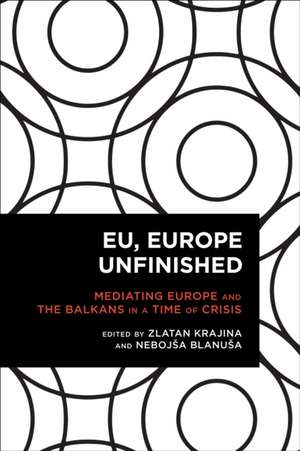Eu, Europe Unfinished: Radical Cultural Studies
en Limba Engleză Paperback – 23 sep 2016
| Toate formatele și edițiile | Preț | Express |
|---|---|---|
| Paperback (1) | 354.64 lei 3-5 săpt. | +13.20 lei 4-10 zile |
| Rowman & Littlefield International – 23 sep 2016 | 354.64 lei 3-5 săpt. | +13.20 lei 4-10 zile |
| Hardback (1) | 899.41 lei 6-8 săpt. | |
| Rowman & Littlefield International – 27 sep 2016 | 899.41 lei 6-8 săpt. |
Preț: 354.64 lei
Nou
Puncte Express: 532
Preț estimativ în valută:
67.88€ • 73.76$ • 57.06£
67.88€ • 73.76$ • 57.06£
Carte disponibilă
Livrare economică 31 martie-14 aprilie
Livrare express 14-20 martie pentru 23.19 lei
Preluare comenzi: 021 569.72.76
Specificații
ISBN-13: 9781783489794
ISBN-10: 1783489790
Pagini: 256
Dimensiuni: 152 x 229 x 21 mm
Greutate: 0.18 kg
Editura: Rowman & Littlefield International
Seria Radical Cultural Studies
ISBN-10: 1783489790
Pagini: 256
Dimensiuni: 152 x 229 x 21 mm
Greutate: 0.18 kg
Editura: Rowman & Littlefield International
Seria Radical Cultural Studies
Cuprins
Acknowledgements / Introduction: Why the Balkans, Why Now, Who Cares, Zlatan Krajina / Part I: Europeanising / 1. Re-assembling and Disciplining Social Europe: Turbulent Moments and Fragile F(r)ictions, Noémi Lendvai and Paul Stubbs / 2. European Media Policy Limitations in the Balkans: Observations on TV Pink BH, Monika Metykova / Part II: Renaming / 3. The Renaming Machine in the Balkans as a Strategy of ¿Accumulation by Dispossession¿, Suzana Milevska / 4. Balkan Mimesis: Kitsch as a Geographic Concept, Ivaylo Ditchev / Part III: Representing / 5. `Europe Unfinished¿ in Bosnia and Herzegovina: The 2014 Protests in the International Media, Eunice Castro Seixas / 6. The Balkans Go Global: Mikhail Veshim¿s The English Neighbour and the post-socialist variations on ¿the Balkan¿ theme, Milena Marinkova / 7. EUrientation Anxieties: Islamic Sexualities and the Construction of Europeanness, Piro Rexhepi / Part IV: Accessing / 8. Transnational Aesthetics: Apprehending Time Between the Balkans and Europe in Contemporary Art Practices, Uro ¿voro / 9. How we Survived Europe (and Never Laughed): The Role of Liberal-Humanitarian Utopia in Croatiäs Accession to the EU, Orlanda Obad / 10. The Foreigners, Claudia Ciobanu / Part V: Conclusion / 11. Can Western Europe be at Home in the Balkans?, Slavenka Drakuli¿, David Morley, Zlatan Krajina and Neboja Blanua / Index / Notes on Contributors
Notă biografică
Descriere
Explores the rapidly changing relationship between the Balkans and the EU in a time of crisis














